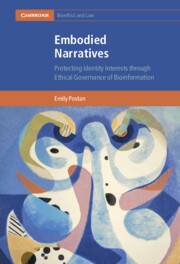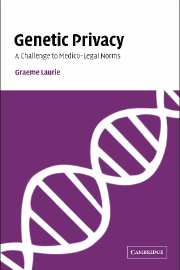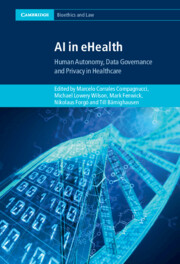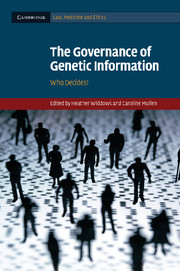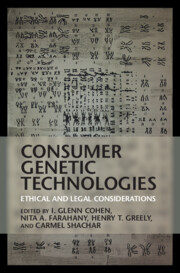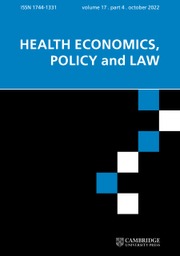Embodied Narratives
Protecting Identity Interests through Ethical Governance of Bioinformation
$110.00 (F)
Part of Cambridge Bioethics and Law
- Author: Emily Postan, University of Edinburgh
- Date Published: July 2022
- availability: Available
- format: Hardback
- isbn: 9781108483742
$
110.00
(F)
Hardback
Other available formats:
Paperback, eBook
Looking for an examination copy?
If you are interested in the title for your course we can consider offering an examination copy. To register your interest please contact [email protected] providing details of the course you are teaching.
-
Increasing quantities of information about our health, bodies, and biological relationships are being generated by health technologies, research, and surveillance. This escalation presents challenges to us all when it comes to deciding how to manage this information and what should be disclosed to the very people it describes. This book establishes the ethical imperative to take seriously the potential impacts on our identities of encountering bioinformation about ourselves. Emily Postan argues that identity interests in accessing personal bioinformation are currently under-protected in law and often linked to problematic bio-essentialist assumptions. Drawing on a picture of identity constructed through embodied self-narratives, and examples of people's encounters with diverse kinds of information, Postan addresses these gaps. This book provides a robust account of the source, scope, and ethical significance of our identity-related interests in accessing – and not accessing – bioinformation about ourselves, and the need for disclosure practices to respond appropriately. This title is also available as Open Access on Cambridge Core.
Read more- Offers a conceptually and ethically robust picture of the impacts on our identities of accessing bioinformation about ourselves, without claiming that identity is determined by biology
- Adopts an interdisciplinary approach to investigating and characterising the nature of identity-interests, providing an evidence-based account that is accessible to readers from diverse disciplines
- Provides account of identity-interests that is not limited to one kind of health or biological information, developing a theory that can be applied to different categories of bioinformation
- This title is also available as Open Access on Cambridge Core
Reviews & endorsements
‘… this book has something to offer everyone who is interested in narrative identity, the ethics of accessing personal bioinformation, or both.' David DeGrazia, Bioethics
Customer reviews
Not yet reviewed
Be the first to review
Review was not posted due to profanity
×Product details
- Date Published: July 2022
- format: Hardback
- isbn: 9781108483742
- length: 250 pages
- dimensions: 235 x 158 x 23 mm
- weight: 0.61kg
- availability: Available
Table of Contents
1. Attending to identity
2. Mapping the landscape
3. Narrative self-constitution
4. Bioinformation in embodied identity narratives
5. Encounters with bioinformation: three examples
6. Locating identity interests
7. Responsibilities for disclosure
8. Protecting identity in practice.
Sorry, this resource is locked
Please register or sign in to request access. If you are having problems accessing these resources please email [email protected]
Register Sign in» Proceed
You are now leaving the Cambridge University Press website. Your eBook purchase and download will be completed by our partner www.ebooks.com. Please see the permission section of the www.ebooks.com catalogue page for details of the print & copy limits on our eBooks.
Continue ×Are you sure you want to delete your account?
This cannot be undone.
Thank you for your feedback which will help us improve our service.
If you requested a response, we will make sure to get back to you shortly.
×
